Unit 3 I'm more outgoing than my sister. 词汇与短语课件(共60张PPT) 人教版八年级英语下册
文档属性
| 名称 | Unit 3 I'm more outgoing than my sister. 词汇与短语课件(共60张PPT) 人教版八年级英语下册 | 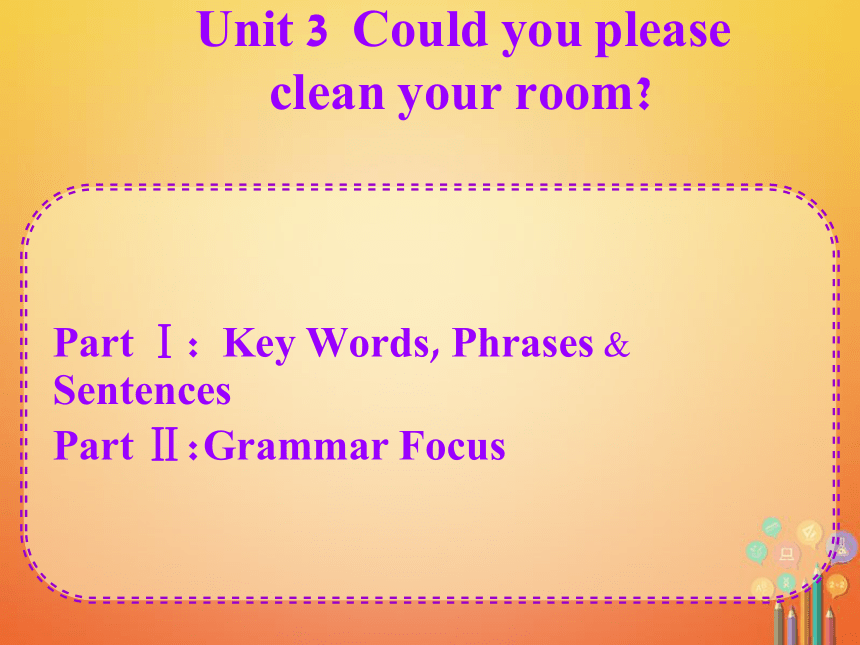 | |
| 格式 | pptx | ||
| 文件大小 | 29.6MB | ||
| 资源类型 | 教案 | ||
| 版本资源 | 人教新目标(Go for it)版 | ||
| 科目 | 英语 | ||
| 更新时间 | 2025-01-03 14:58:43 | ||
图片预览


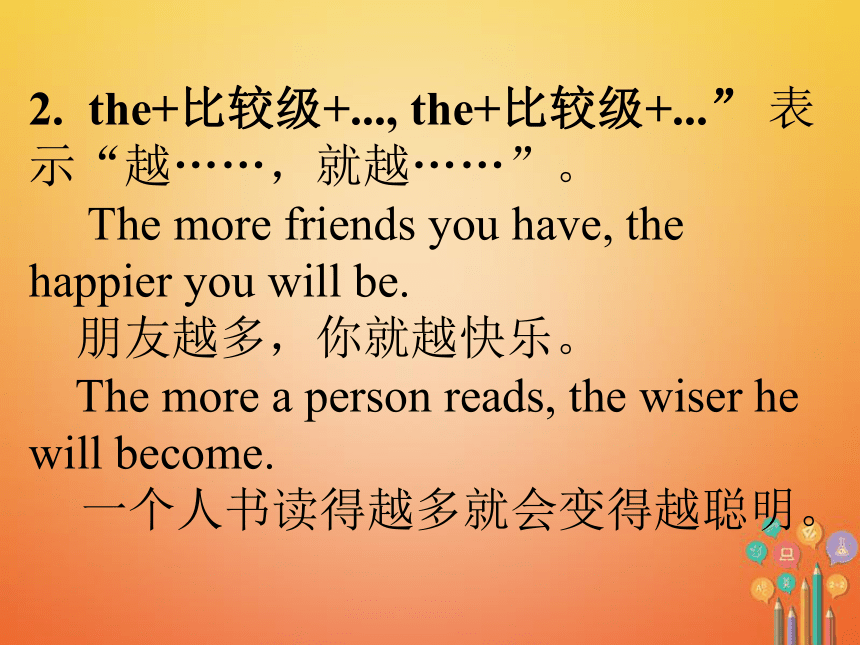
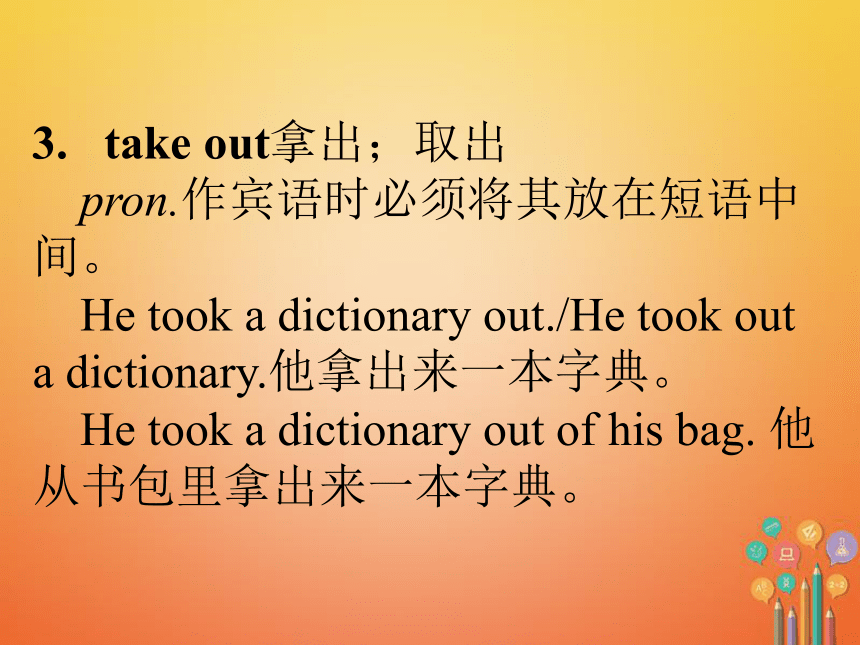
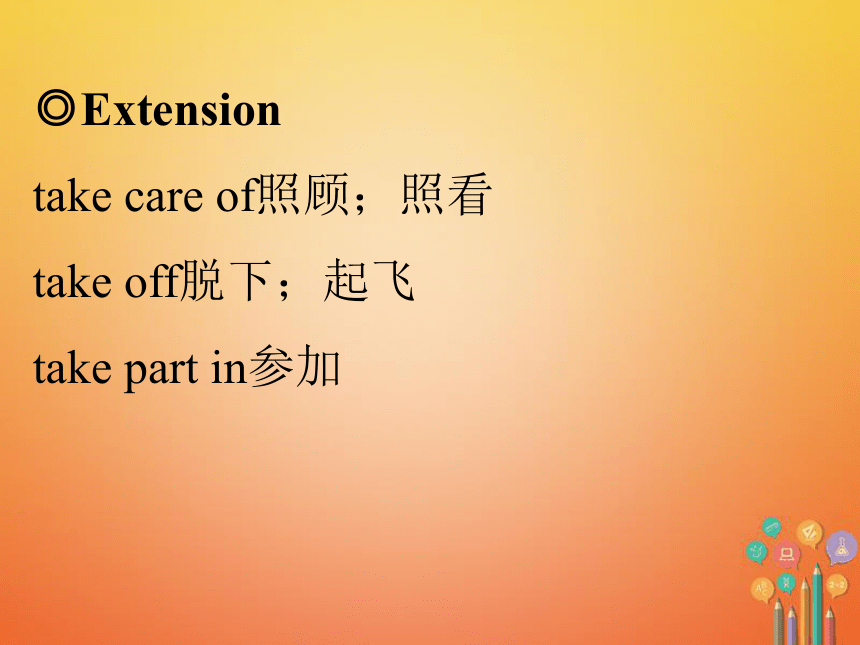
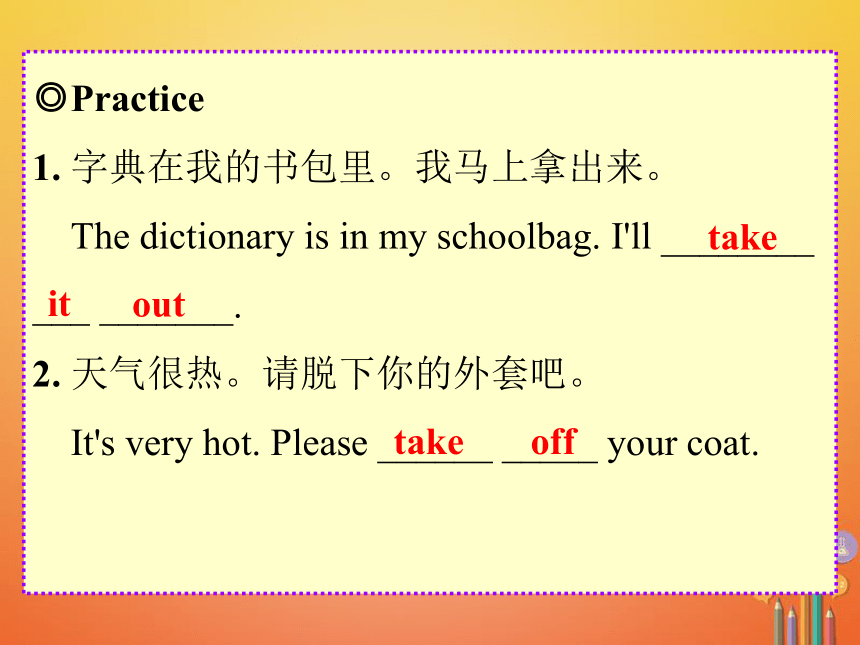
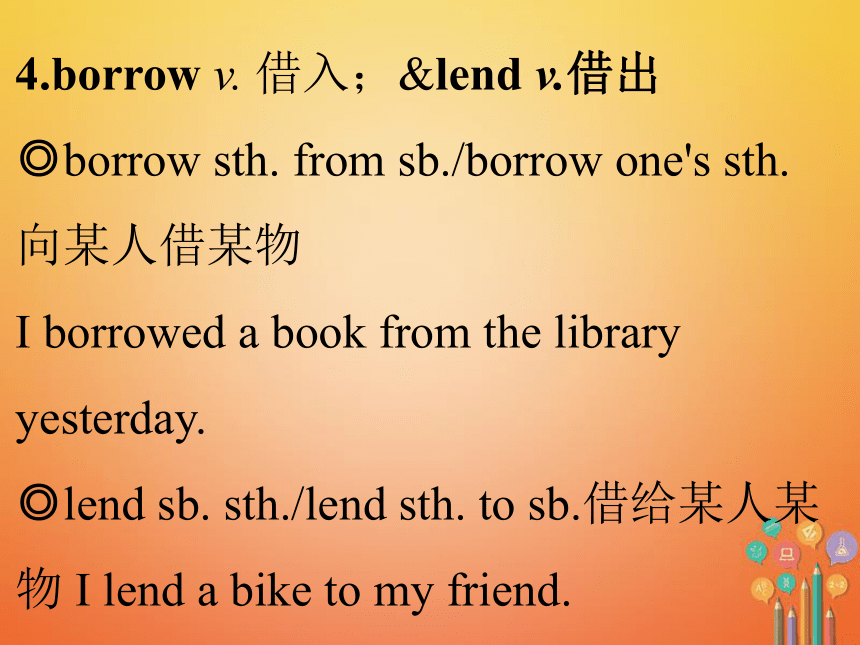
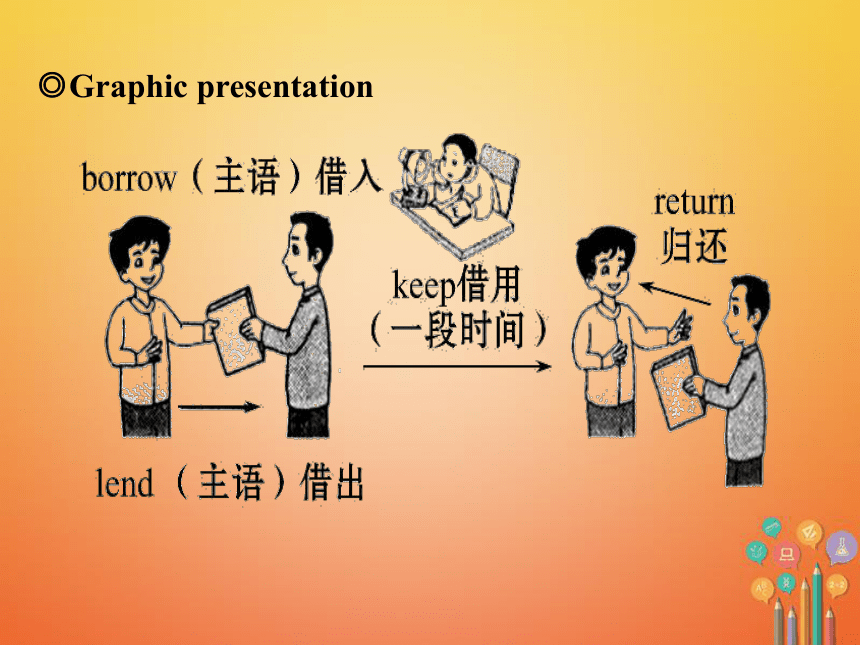
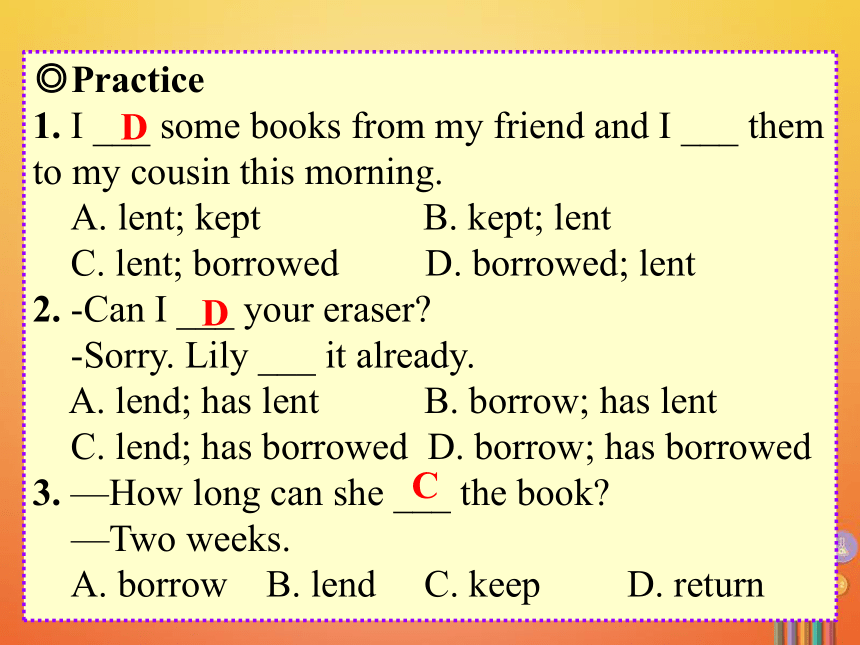
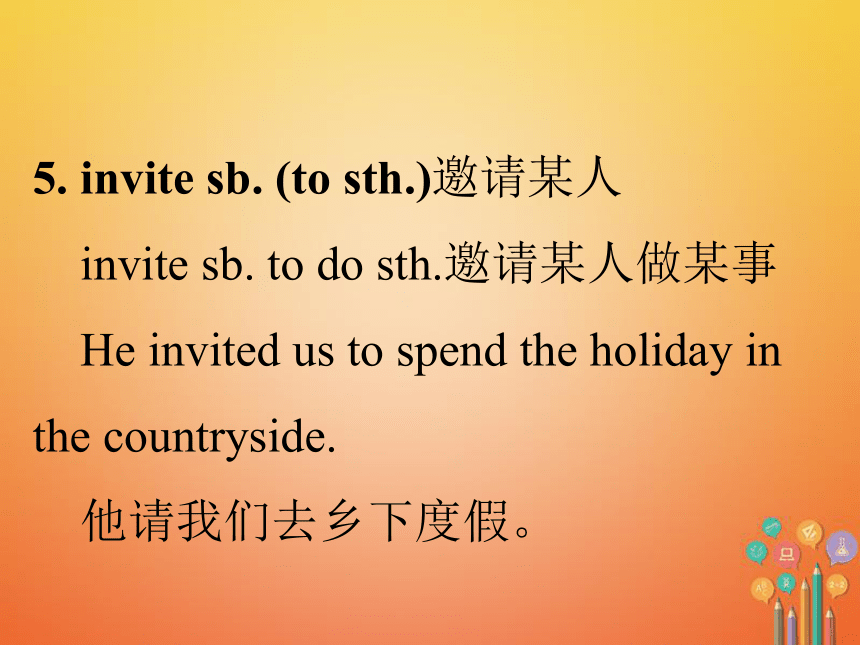


文档简介
(共60张PPT)
Unit 3 Could you please
clean your room
Part Ⅰ: Key Words, Phrases & Sentences
Part Ⅱ:Grammar Focus
Part Ⅱ: Key Words, Phrases & Sentences
1. help out (with sth.)“给予帮助”。
help与out之间还可以加具体的人。
Can you help me out with the clean-up?
你能帮助我做大扫除吗?
2. the+比较级+..., the+比较级+...” 表示“越……,就越……”。
The more friends you have, the happier you will be.
朋友越多,你就越快乐。
The more a person reads, the wiser he will become.
一个人书读得越多就会变得越聪明。
3. take out拿出;取出
pron.作宾语时必须将其放在短语中间。
He took a dictionary out./He took out a dictionary.他拿出来一本字典。
He took a dictionary out of his bag. 他从书包里拿出来一本字典。
◎Extension
take care of照顾;照看
take off脱下;起飞
take part in参加
◎Practice
1. 字典在我的书包里。我马上拿出来。
The dictionary is in my schoolbag. I'll ________ ___ _______.
2. 天气很热。请脱下你的外套吧。
It's very hot. Please ______ _____ your coat.
take
out
take off
it
4.borrow v. 借入;&lend v.借出
◎borrow sth. from sb./borrow one's sth.向某人借某物
I borrowed a book from the library yesterday.
◎lend sb. sth./lend sth. to sb.借给某人某物 I lend a bike to my friend.
◎Graphic presentation
◎Practice
1. I ___ some books from my friend and I ___ them to my cousin this morning.
A. lent; kept B. kept; lent
C. lent; borrowed D. borrowed; lent
2. -Can I ___ your eraser
-Sorry. Lily ___ it already.
A. lend; has lent B. borrow; has lent
C. lend; has borrowed D. borrow; has borrowed
3. —How long can she ___ the book
—Two weeks.
A. borrow B. lend C. keep D. return
D
D
C
5. invite sb. (to sth.)邀请某人
invite sb. to do sth.邀请某人做某事
He invited us to spend the holiday in the countryside.
他请我们去乡下度假。
◎Practice
1. 他们将邀请一位著名的科学家做演讲。
They'll _____ a famous scientist ____________ a speech.
2. 这个周末吉姆想邀请朋友们来参加他的生日聚会。
Jim wants to _____ his friends _____ his birthday party this weekend.
to give/make
invite
invite
to
6. as ... as“和……一样”,表示同级的比较。其基本结构为as+adj./adv.+as。
否定形式为“not as/so+adj./adv.+as”。
I'm just as tired as you are!
This film is as interesting as that one.
这部电影和那部电影一样有趣。
He didn't act as well as you.
他表现得不如你好。
7. neither adv.也不
“neither+be动词/情态动词/do+主语”是倒装结构,表示前面所述否定内容适用于另一人或物,采用部分倒装。 neither可用nor替换。
--He isn't a doctor.--Neither am I.
--He can't swim.--Neither can I.
◎Practice
1. Chris was not at home and neither _______ his sister.
2. My father can't swim and neither _______ I.
3. Tom didn't believe a word she said, and neither _______ the police.
was
did
can
◎Extension
“so + 助动词(be动词/情态动词/do) + 主语”表示前面所述肯定内容也适用于另一主语
--I am a student.--So am I.
--I can dance.--So am I.
--I like playing basketball.--So do I.
◎Practice
1. Jonathan is a little bit upset, so _______ I.
2. His mother must go home early, so _______ he.
3. I enjoy this movie, so _______ Martin.
am
must
does
◎三个也:also, either, too
1. also,用在肯定句,放在句中。
Peter also has two brothers.
皮特也有两个兄弟。
I am also a student.
我也是一名学生。
Mrs. Green can also sing the song in Chinese.
格林夫人也能用汉语唱这首歌。
2. too用在肯定句中,句末。
I'm in Row 1, too.
我也在第一排。
3. either用于否定句,句末。
I don't know him. Tom doesn't know him, either.
我不认识他,汤姆也不认识他。
8. while conj.在……期间;当……的时候。
While children have fun, parents can take dance lessons on the beach.
孩子们玩耍时, 家长们可以在海滩上学跳舞。
I'll finish my homework while you help me with the dishes.
你帮我洗餐具时我将完成我的作业。
Usages & e.g.
引导时间状语从句, 强调主从句的动词所表示的动作或状态同时发生。While I was doing my homework last night, my parents were watching TV.昨天晚上我在做作业时,我的父母在看电视。
作conj.,意为“然而”,表对比。Some people waste food while others don't have enough.有些人浪费食物,然而有些人却没有足够的食物。
作n.,意为“一会儿; 一段时间”。We are off for a while.我们要离开一会儿。
◎Practice
1. 你们做作业时, 请不要闲聊。
Please don't chat _____ you're _____ your homework.
2. 昨天我在公园里散步时, 看到一只猫爬到了一棵高大的树上。
_____ I was ______ a walk in the park, I saw a cat climb up a tall tree.
3. My father was preparing for his speech ___ my mother was doing some washing last night.
A. before B. while C. after D. until
while
doing
taking
While
B
14. in order to目的是;为了。后接动词原形,构成短语in order to do sth.,表示目的;其否定式结构为in order not to do sth.为了不做某事
They should spend their time on schoolwork in order to get good grades and get into a good university.
为了取得好成绩和进入一所好的大学, 他们应该把时间花费在学业上。
14. mess n.杂乱,不可数名词。其常用短语 in a mess 意为“乱七八糟”
What a mess!太乱了!
Look! the room is in a mess!看这房子一团糟糕!
mess还可以作动词,意为“把…弄乱”,常见短语 mess up
Don't let the trouble mess up your life.
14. depend n.依靠;v.依靠,依赖
Children these days depend on their parents too much.
如今孩子们太依赖他们的父母了。
15.develop v.发展
短语develop into.意为“发展成
I‘m looking for a job which can help me develop my skills.我正在找一份能帮我发展我的技能的工作。
16. as soon as 一...就...
引导时间状语从句,遵循主将从先原则
I will return the money to you back as soon as I have money.
我一有钱就会把钱还给你。
They will get to the hotel as soon as the plane land down.
飞机一降落,他们就会去酒店。
in order to 意为“为了”, 后接v.原,引导目的状语
in order that 意为“为了”, 后接短语,引导目的状语从句
◎Practice
1. 为了使梦想成真, 我们必须努力工作。
____ ________ _____ make our dreams come true, we must work hard.
2. 为了上学不迟到, 琳达每天早晨六点钟就起床。
_____ _______ _____ _____ be late for school, Linda gets up at six every morning.
In order to
In order not to
it作形式主语的三种常见句型结构:
a. It's+adj.+to do...
b. It's +adj.+for sb.+to do...
c. It's +adj.+of sb.+to do...
◎Contrast:
It's+adj.+for sb.+to do... & It's+adj.+of sb.+to do...
15. I think it is important for children to learn how to do chores and help their parents with housework.
我认为对孩子们来说学习如何做家务和帮助父母做家务是很重要的。
当不定式(短语)、动名词(短语)或从句在某句中作主语时,常用it作形式主语置于句首, 而真正的主语放在句尾。
It's+adj.+for sb.+to do... 句中的形容词常表示客观情况,如hard, easy, important等
It's+adj.+of sb.+to do... 句中的形容词常表示人的性格、品质与特点等,如kind, nice, clever等
◎Practice
1. 拥有健康的生活方式很重要。
_____ very important _____ _____ a healthy lifestyle.
2. 对孩子们来说学会如何照顾自己是很有必要的。
_____ necessary _____ children _____ _____ how to look after themselves.
3. 你帮助我做家务, 真是太好了。
_____ kind _____ you _____ _____ me with the housework.
It's
It's
to have
for
to learn
It's
of
to help
16. too much太多
Some students say they used to be much too tired because they had too much homework to do.
一些学生说以前他们太累, 因为他们有太多的作业要做。
◎Contrast: too much & much too & too many
Phrases meanings Usages
too much 太多 后接u.n.
much too 太…… 后接adj.或adv.
too many 太多 后接c.n.(pl)
Part Ⅲ: Grammar Focus
modal v.
1. modal v.
情态动词不能单独做谓语, 除ought和have外, 后面只能接不带to的不定式。情态动词没有非谓语形式,即没有不定式、分词等形式。
情态动词没有人称和数的变化,即情态动词第三人称单数不加-s;但有些情态动词, 如can、will有一般式和过去式的变化。
(1)can & could:could是can的过去式
①can
a. 表示体力或脑力的能力
The girl can dance very well.
b. 表示说话的推测﹑事物的可能性等
Can the news be true
c. 在口语中, can可以表示请求或允许
Can I sit here
—Could you +v.原+... /Could you please+v.原+... (更委婉)请你做……好吗
—Yes, sure./Sure./Of course./No problem./I'm Sorry./Sorry, I can't.
表示“能够”时can=be able to,但can只用于一般现在时或过去时,而be able to可用于各种时态;can表示个人有某种能力,而be able to表示某人通过努力、克服困难做成某事,相当于succeed in doing sth.;叙述过去事实时,最好用was/were able to,因为could只表示过去具有某种能力。
Can you understand the different kinds of English these people are using
Two years later, he was able to speak very good Chinese.
◎Practice
1. —Could you please clean the room
—___ I have to do my homework.
A. Yes, sure. B. Why not
C. Sorry, you can't. D. Sorry, I can't.
2. - Mum, Could I go to Beijing with you
-Yes, ___. But you have to finish your homework first.
A. you can B. you could C. you can't D. you couldn't
D
A
②could
-Could I/we +v.原+... 请问我(们)能做……吗
-Sure./Of course./No problem./I'm sorry/Sorry,
you can't.(若关系比较亲近, 也可直接说No, you can't.)
a. could是can的过去式,表示与过去有关的能力和推测
We all knew that the young man couldn't be a doctor.
b. could可以代替can表示请求,但语气较can客气和委婉。can 表示一般性的请求,语气随便, 常用于熟人之间或长辈对晚辈、上级对下级的场合。could表示有礼貌的请求,语气委婉,常用于非熟人之间或晚辈对长辈、下级对上级的场合。
Could you lend me your dictionary
can和could接动词的完成形式,表示可能已经做某事。can用在否定和疑问句中, 表示不相信、怀疑等态度。
They can't have gone out because the light is still on.
以could或would提问时,不能再以could或would作答,而应该用can或will。
—Could I borrow your dictionary
—Yes, of course you can.
◎Notice
1. 提出委婉的请求在回答中不可用could。
-Could I have the television on
-Yes, you can./No, you can't.
2. 在否定、疑问句中表示推测或怀疑用couldn't。
He couldn't be a bad man.他不大可能是坏人。
3. 在表示“请求帮助、请求允许”疑问句中,常用could代替can,表示礼貌、委婉或不确定;而can则不具备这些语气。这时不能把could看作can的过去式。表示请求帮助或请求允许时,除了can, could之外,还可以用may。
(2)may & might
表示允许或请求,表示没有把握的推测;may放在句首, 表示祝愿。might表示推测时, 不表示时态,只是可能性比may小。
May God bless you!
He might be at home.
(3)have to & must
两词都是“必须”的意思, have to表示客观的需要,must 表示说话人主观上的看法, 即主观的必要。
My brother was very ill, so I had to call the doctor in the middle of the night.
我弟弟病得很厉害,我只得半夜里把医生请来。
He said that they must work hard.
他说他们必须努力工作。
have to有人称、数、时态的变化,而must只有一种形式。但must可用于间接引语中表示过去的必要或义务。
He had to look after his sister yesterday.
在否定结构中,don't have to表示“不必”,mustn't表示“禁止”。
You don't have to tell him about it.
你不一定要把此事告诉他。
You mustn't tell him about it.
你一定不要把这件事告诉他。
◎Practice
Ⅰ. Complete the sentences.
1. ——请你教我如何制作香蕉奶昔好吗
——好的, 当然可以。
—______ you please ______ me how to make a banana
milk shake
—___, ____.
2. ——请你把我们的院子打扫一下好吗
——当然可以。
—_______ you please ______ our yard
—_________________.
Could
teach
Yes
sure
Sure/Certainly/OK
Could
sweep
3. ——请你帮我洗车好吗
——对不起, 我不能。我必须去上学。
—Could you please help me wash the car
—_____, ____ ______. I have to go to school.
4. ——我能坐在这儿吗
——是的, 你可以坐这儿。
—______ I _____ here
—Yes, you _____.
5. ——我能借一下你的电动车吗
——对不起。我得骑车外出。
—_______ I _______ your e-bike
—_____. I have to ride it to go out.
Sorry
I can't
Sorry
Could
Could
sit
can
borrow
Ⅱ. Choose
1. —___ I go out to play now, Mum
—No, you ___.
A. Could, couldn't B. Could, can't
C. Can, mustn't D. Can, needn't
2. They started early that morning in order that they____ there before noon.
A. might get B. may get
C. would get D. got
B
C
3. Bob can not come out to play because he ___ help Dad in the garden.
A. can B. can not C. has to D. must
4. You ___ wait for me yesterday.
A. haven't B. hadn't C. don't have to D. didn't have to
C
D
课文内容
Question:
1-What did the girl's mother ask the girl to do
2-What did the girl reply after her mother tell her to do that
3-What happened after a week the next day
4-Why was the girl's mother angrry with her
5-How did her mother do for a week
Last month, our dog welcomed me when I came home from school. He wanted a walk, but I was too tired. I threw down my bag and went to the living room. The minute I sat down in front of the TV, my mom came over.
“Could you please take the dog for a walk ” she asked.
“Could I watch one show first ” I asked.
“No!” she replied angrily. “You watch TV all the time and never help out around the house! I can’t work all day and do housework all evening.”
“Well, I work all day at school, too! I’m just as tired as you are!” I shouted back.
My mom did not say anything and walked away. For one week, she did not do any
housework and neither did I. Finally, I could not find a clean dish or a clean shirt.
The next day, my mom came home from work to find the house clean and tidy.
“What happened ” she asked in surprise.
“I’m so sorry, Mom. I finally understand that we need to share the housework to have a clean and comfortable home,” I replied.
The Sunday Mail magazine invited parents to write about whether they think young people should do chores at home. Reading the following letters. Which one agrees and which one disagrees
Skimming
This means looking quickly through a piece of writing to find the main idea without reading every word. It is still a good idea to read the first sentence in each paragraph a little more carefully.
2b
Question:
1-What does Ms Miller think of home work
2-what should students do according to Ms Miller
3-Is it parents need to provide a clean environment for children
4-What does Mr Smith think about doing chore at home for children?
5-Why does Mr Simth think that children should do chore
Dear Sir,
I do not understand why some parents make their kids help with housework and chores at home. Kids these days already have enough stress from school.They do not have time to study and do housework, too. Housework is a waste of their time. Could we just let them do their job as students They should spend their time on schoolwork in
order to get good grades and get into a good university. Also, when they get older, they will have to do housework so there is no need for them to do it now. It is the parents’ job to provide a clean and comfortable environment at home for their children. And anyway, I think doing chores is not so difficult. I do not mind doing them.
Ms. Miller
Dear Sir,
I think it is important for children to learn how to do chores and help their parents with housework. It is not enough to just get good grades at school. Children these days depend on their parents too much. They are always asking, “Could you get this for me ” or “Could you help me with that ” Doing chores helps to develop children’s independence and teaches them how to look after themselves.
It also helps them to understand the idea of fairness. Since they live in one house with their parents, they should know that everyone should do their part in keeping it clean and tidy. Our neighbors’ son got into a good college but during his first year, he had no idea how to take care of himself. As a result, he often fell ill and his grades dropped. The earlier kids learn to be independent, the better it is for their future.
Mr. Smith
Unit 3 Could you please
clean your room
Part Ⅰ: Key Words, Phrases & Sentences
Part Ⅱ:Grammar Focus
Part Ⅱ: Key Words, Phrases & Sentences
1. help out (with sth.)“给予帮助”。
help与out之间还可以加具体的人。
Can you help me out with the clean-up?
你能帮助我做大扫除吗?
2. the+比较级+..., the+比较级+...” 表示“越……,就越……”。
The more friends you have, the happier you will be.
朋友越多,你就越快乐。
The more a person reads, the wiser he will become.
一个人书读得越多就会变得越聪明。
3. take out拿出;取出
pron.作宾语时必须将其放在短语中间。
He took a dictionary out./He took out a dictionary.他拿出来一本字典。
He took a dictionary out of his bag. 他从书包里拿出来一本字典。
◎Extension
take care of照顾;照看
take off脱下;起飞
take part in参加
◎Practice
1. 字典在我的书包里。我马上拿出来。
The dictionary is in my schoolbag. I'll ________ ___ _______.
2. 天气很热。请脱下你的外套吧。
It's very hot. Please ______ _____ your coat.
take
out
take off
it
4.borrow v. 借入;&lend v.借出
◎borrow sth. from sb./borrow one's sth.向某人借某物
I borrowed a book from the library yesterday.
◎lend sb. sth./lend sth. to sb.借给某人某物 I lend a bike to my friend.
◎Graphic presentation
◎Practice
1. I ___ some books from my friend and I ___ them to my cousin this morning.
A. lent; kept B. kept; lent
C. lent; borrowed D. borrowed; lent
2. -Can I ___ your eraser
-Sorry. Lily ___ it already.
A. lend; has lent B. borrow; has lent
C. lend; has borrowed D. borrow; has borrowed
3. —How long can she ___ the book
—Two weeks.
A. borrow B. lend C. keep D. return
D
D
C
5. invite sb. (to sth.)邀请某人
invite sb. to do sth.邀请某人做某事
He invited us to spend the holiday in the countryside.
他请我们去乡下度假。
◎Practice
1. 他们将邀请一位著名的科学家做演讲。
They'll _____ a famous scientist ____________ a speech.
2. 这个周末吉姆想邀请朋友们来参加他的生日聚会。
Jim wants to _____ his friends _____ his birthday party this weekend.
to give/make
invite
invite
to
6. as ... as“和……一样”,表示同级的比较。其基本结构为as+adj./adv.+as。
否定形式为“not as/so+adj./adv.+as”。
I'm just as tired as you are!
This film is as interesting as that one.
这部电影和那部电影一样有趣。
He didn't act as well as you.
他表现得不如你好。
7. neither adv.也不
“neither+be动词/情态动词/do+主语”是倒装结构,表示前面所述否定内容适用于另一人或物,采用部分倒装。 neither可用nor替换。
--He isn't a doctor.--Neither am I.
--He can't swim.--Neither can I.
◎Practice
1. Chris was not at home and neither _______ his sister.
2. My father can't swim and neither _______ I.
3. Tom didn't believe a word she said, and neither _______ the police.
was
did
can
◎Extension
“so + 助动词(be动词/情态动词/do) + 主语”表示前面所述肯定内容也适用于另一主语
--I am a student.--So am I.
--I can dance.--So am I.
--I like playing basketball.--So do I.
◎Practice
1. Jonathan is a little bit upset, so _______ I.
2. His mother must go home early, so _______ he.
3. I enjoy this movie, so _______ Martin.
am
must
does
◎三个也:also, either, too
1. also,用在肯定句,放在句中。
Peter also has two brothers.
皮特也有两个兄弟。
I am also a student.
我也是一名学生。
Mrs. Green can also sing the song in Chinese.
格林夫人也能用汉语唱这首歌。
2. too用在肯定句中,句末。
I'm in Row 1, too.
我也在第一排。
3. either用于否定句,句末。
I don't know him. Tom doesn't know him, either.
我不认识他,汤姆也不认识他。
8. while conj.在……期间;当……的时候。
While children have fun, parents can take dance lessons on the beach.
孩子们玩耍时, 家长们可以在海滩上学跳舞。
I'll finish my homework while you help me with the dishes.
你帮我洗餐具时我将完成我的作业。
Usages & e.g.
引导时间状语从句, 强调主从句的动词所表示的动作或状态同时发生。While I was doing my homework last night, my parents were watching TV.昨天晚上我在做作业时,我的父母在看电视。
作conj.,意为“然而”,表对比。Some people waste food while others don't have enough.有些人浪费食物,然而有些人却没有足够的食物。
作n.,意为“一会儿; 一段时间”。We are off for a while.我们要离开一会儿。
◎Practice
1. 你们做作业时, 请不要闲聊。
Please don't chat _____ you're _____ your homework.
2. 昨天我在公园里散步时, 看到一只猫爬到了一棵高大的树上。
_____ I was ______ a walk in the park, I saw a cat climb up a tall tree.
3. My father was preparing for his speech ___ my mother was doing some washing last night.
A. before B. while C. after D. until
while
doing
taking
While
B
14. in order to目的是;为了。后接动词原形,构成短语in order to do sth.,表示目的;其否定式结构为in order not to do sth.为了不做某事
They should spend their time on schoolwork in order to get good grades and get into a good university.
为了取得好成绩和进入一所好的大学, 他们应该把时间花费在学业上。
14. mess n.杂乱,不可数名词。其常用短语 in a mess 意为“乱七八糟”
What a mess!太乱了!
Look! the room is in a mess!看这房子一团糟糕!
mess还可以作动词,意为“把…弄乱”,常见短语 mess up
Don't let the trouble mess up your life.
14. depend n.依靠;v.依靠,依赖
Children these days depend on their parents too much.
如今孩子们太依赖他们的父母了。
15.develop v.发展
短语develop into.意为“发展成
I‘m looking for a job which can help me develop my skills.我正在找一份能帮我发展我的技能的工作。
16. as soon as 一...就...
引导时间状语从句,遵循主将从先原则
I will return the money to you back as soon as I have money.
我一有钱就会把钱还给你。
They will get to the hotel as soon as the plane land down.
飞机一降落,他们就会去酒店。
in order to 意为“为了”, 后接v.原,引导目的状语
in order that 意为“为了”, 后接短语,引导目的状语从句
◎Practice
1. 为了使梦想成真, 我们必须努力工作。
____ ________ _____ make our dreams come true, we must work hard.
2. 为了上学不迟到, 琳达每天早晨六点钟就起床。
_____ _______ _____ _____ be late for school, Linda gets up at six every morning.
In order to
In order not to
it作形式主语的三种常见句型结构:
a. It's+adj.+to do...
b. It's +adj.+for sb.+to do...
c. It's +adj.+of sb.+to do...
◎Contrast:
It's+adj.+for sb.+to do... & It's+adj.+of sb.+to do...
15. I think it is important for children to learn how to do chores and help their parents with housework.
我认为对孩子们来说学习如何做家务和帮助父母做家务是很重要的。
当不定式(短语)、动名词(短语)或从句在某句中作主语时,常用it作形式主语置于句首, 而真正的主语放在句尾。
It's+adj.+for sb.+to do... 句中的形容词常表示客观情况,如hard, easy, important等
It's+adj.+of sb.+to do... 句中的形容词常表示人的性格、品质与特点等,如kind, nice, clever等
◎Practice
1. 拥有健康的生活方式很重要。
_____ very important _____ _____ a healthy lifestyle.
2. 对孩子们来说学会如何照顾自己是很有必要的。
_____ necessary _____ children _____ _____ how to look after themselves.
3. 你帮助我做家务, 真是太好了。
_____ kind _____ you _____ _____ me with the housework.
It's
It's
to have
for
to learn
It's
of
to help
16. too much太多
Some students say they used to be much too tired because they had too much homework to do.
一些学生说以前他们太累, 因为他们有太多的作业要做。
◎Contrast: too much & much too & too many
Phrases meanings Usages
too much 太多 后接u.n.
much too 太…… 后接adj.或adv.
too many 太多 后接c.n.(pl)
Part Ⅲ: Grammar Focus
modal v.
1. modal v.
情态动词不能单独做谓语, 除ought和have外, 后面只能接不带to的不定式。情态动词没有非谓语形式,即没有不定式、分词等形式。
情态动词没有人称和数的变化,即情态动词第三人称单数不加-s;但有些情态动词, 如can、will有一般式和过去式的变化。
(1)can & could:could是can的过去式
①can
a. 表示体力或脑力的能力
The girl can dance very well.
b. 表示说话的推测﹑事物的可能性等
Can the news be true
c. 在口语中, can可以表示请求或允许
Can I sit here
—Could you +v.原+... /Could you please+v.原+... (更委婉)请你做……好吗
—Yes, sure./Sure./Of course./No problem./I'm Sorry./Sorry, I can't.
表示“能够”时can=be able to,但can只用于一般现在时或过去时,而be able to可用于各种时态;can表示个人有某种能力,而be able to表示某人通过努力、克服困难做成某事,相当于succeed in doing sth.;叙述过去事实时,最好用was/were able to,因为could只表示过去具有某种能力。
Can you understand the different kinds of English these people are using
Two years later, he was able to speak very good Chinese.
◎Practice
1. —Could you please clean the room
—___ I have to do my homework.
A. Yes, sure. B. Why not
C. Sorry, you can't. D. Sorry, I can't.
2. - Mum, Could I go to Beijing with you
-Yes, ___. But you have to finish your homework first.
A. you can B. you could C. you can't D. you couldn't
D
A
②could
-Could I/we +v.原+... 请问我(们)能做……吗
-Sure./Of course./No problem./I'm sorry/Sorry,
you can't.(若关系比较亲近, 也可直接说No, you can't.)
a. could是can的过去式,表示与过去有关的能力和推测
We all knew that the young man couldn't be a doctor.
b. could可以代替can表示请求,但语气较can客气和委婉。can 表示一般性的请求,语气随便, 常用于熟人之间或长辈对晚辈、上级对下级的场合。could表示有礼貌的请求,语气委婉,常用于非熟人之间或晚辈对长辈、下级对上级的场合。
Could you lend me your dictionary
can和could接动词的完成形式,表示可能已经做某事。can用在否定和疑问句中, 表示不相信、怀疑等态度。
They can't have gone out because the light is still on.
以could或would提问时,不能再以could或would作答,而应该用can或will。
—Could I borrow your dictionary
—Yes, of course you can.
◎Notice
1. 提出委婉的请求在回答中不可用could。
-Could I have the television on
-Yes, you can./No, you can't.
2. 在否定、疑问句中表示推测或怀疑用couldn't。
He couldn't be a bad man.他不大可能是坏人。
3. 在表示“请求帮助、请求允许”疑问句中,常用could代替can,表示礼貌、委婉或不确定;而can则不具备这些语气。这时不能把could看作can的过去式。表示请求帮助或请求允许时,除了can, could之外,还可以用may。
(2)may & might
表示允许或请求,表示没有把握的推测;may放在句首, 表示祝愿。might表示推测时, 不表示时态,只是可能性比may小。
May God bless you!
He might be at home.
(3)have to & must
两词都是“必须”的意思, have to表示客观的需要,must 表示说话人主观上的看法, 即主观的必要。
My brother was very ill, so I had to call the doctor in the middle of the night.
我弟弟病得很厉害,我只得半夜里把医生请来。
He said that they must work hard.
他说他们必须努力工作。
have to有人称、数、时态的变化,而must只有一种形式。但must可用于间接引语中表示过去的必要或义务。
He had to look after his sister yesterday.
在否定结构中,don't have to表示“不必”,mustn't表示“禁止”。
You don't have to tell him about it.
你不一定要把此事告诉他。
You mustn't tell him about it.
你一定不要把这件事告诉他。
◎Practice
Ⅰ. Complete the sentences.
1. ——请你教我如何制作香蕉奶昔好吗
——好的, 当然可以。
—______ you please ______ me how to make a banana
milk shake
—___, ____.
2. ——请你把我们的院子打扫一下好吗
——当然可以。
—_______ you please ______ our yard
—_________________.
Could
teach
Yes
sure
Sure/Certainly/OK
Could
sweep
3. ——请你帮我洗车好吗
——对不起, 我不能。我必须去上学。
—Could you please help me wash the car
—_____, ____ ______. I have to go to school.
4. ——我能坐在这儿吗
——是的, 你可以坐这儿。
—______ I _____ here
—Yes, you _____.
5. ——我能借一下你的电动车吗
——对不起。我得骑车外出。
—_______ I _______ your e-bike
—_____. I have to ride it to go out.
Sorry
I can't
Sorry
Could
Could
sit
can
borrow
Ⅱ. Choose
1. —___ I go out to play now, Mum
—No, you ___.
A. Could, couldn't B. Could, can't
C. Can, mustn't D. Can, needn't
2. They started early that morning in order that they____ there before noon.
A. might get B. may get
C. would get D. got
B
C
3. Bob can not come out to play because he ___ help Dad in the garden.
A. can B. can not C. has to D. must
4. You ___ wait for me yesterday.
A. haven't B. hadn't C. don't have to D. didn't have to
C
D
课文内容
Question:
1-What did the girl's mother ask the girl to do
2-What did the girl reply after her mother tell her to do that
3-What happened after a week the next day
4-Why was the girl's mother angrry with her
5-How did her mother do for a week
Last month, our dog welcomed me when I came home from school. He wanted a walk, but I was too tired. I threw down my bag and went to the living room. The minute I sat down in front of the TV, my mom came over.
“Could you please take the dog for a walk ” she asked.
“Could I watch one show first ” I asked.
“No!” she replied angrily. “You watch TV all the time and never help out around the house! I can’t work all day and do housework all evening.”
“Well, I work all day at school, too! I’m just as tired as you are!” I shouted back.
My mom did not say anything and walked away. For one week, she did not do any
housework and neither did I. Finally, I could not find a clean dish or a clean shirt.
The next day, my mom came home from work to find the house clean and tidy.
“What happened ” she asked in surprise.
“I’m so sorry, Mom. I finally understand that we need to share the housework to have a clean and comfortable home,” I replied.
The Sunday Mail magazine invited parents to write about whether they think young people should do chores at home. Reading the following letters. Which one agrees and which one disagrees
Skimming
This means looking quickly through a piece of writing to find the main idea without reading every word. It is still a good idea to read the first sentence in each paragraph a little more carefully.
2b
Question:
1-What does Ms Miller think of home work
2-what should students do according to Ms Miller
3-Is it parents need to provide a clean environment for children
4-What does Mr Smith think about doing chore at home for children?
5-Why does Mr Simth think that children should do chore
Dear Sir,
I do not understand why some parents make their kids help with housework and chores at home. Kids these days already have enough stress from school.They do not have time to study and do housework, too. Housework is a waste of their time. Could we just let them do their job as students They should spend their time on schoolwork in
order to get good grades and get into a good university. Also, when they get older, they will have to do housework so there is no need for them to do it now. It is the parents’ job to provide a clean and comfortable environment at home for their children. And anyway, I think doing chores is not so difficult. I do not mind doing them.
Ms. Miller
Dear Sir,
I think it is important for children to learn how to do chores and help their parents with housework. It is not enough to just get good grades at school. Children these days depend on their parents too much. They are always asking, “Could you get this for me ” or “Could you help me with that ” Doing chores helps to develop children’s independence and teaches them how to look after themselves.
It also helps them to understand the idea of fairness. Since they live in one house with their parents, they should know that everyone should do their part in keeping it clean and tidy. Our neighbors’ son got into a good college but during his first year, he had no idea how to take care of himself. As a result, he often fell ill and his grades dropped. The earlier kids learn to be independent, the better it is for their future.
Mr. Smith
同课章节目录
- Unit 1 Where did you go on vacation?
- Section A
- Section B
- Unit 2 How often do you exercise?
- Section A
- Section B
- Unit 3 I'm more outgoing than my sister.
- Section A
- Section B
- Unit 4 What's the best movie theater?
- Section A
- Section B
- Unit 5 Do you want to watch a game show?
- Section A
- Section B
- Unit 6 I'm going to study computer science.
- Section A
- Section B
- Unit 7 Will people have robots?
- Section A
- Section B
- Unit 8 How do you make a banana milk shake?
- Section A
- Section B
- Unit 9 Can you come to my party?
- Section A
- Section B
- Unit 10 If you go to the party, you'll have a grea
- Section A
- Section B
